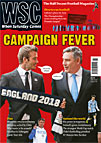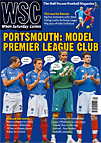 Dear WSC
Dear WSC
The article on the FA Cup’s longest tie (Draw to a close, WSC 298) reminded me of what I believe is still officially the longest single match between two English sides – the second leg of a Division Three cup tie between Stockport County and Doncaster Rovers on March 30, 1946. After extra time, the score stood at 2-2 – which was also the score following the first leg. Having checked with the local authorities, the referee let the game carry on until one team scored, the original Golden Goal. After 203 minutes and with darkness setting in, the match was finally brought to an end. The story goes that fans left the match to go home for their tea and returned later to carry on watching. The replay at Doncaster was won by the home team 4-0. This might not be quite as impressive as the longest football match ever, which I believe currently standards at 57 hours. This epic encounter between Leeds Badgers and Warwickshire Wolves in 2010 was played to raise money for charity.
Alan Bredee, Enfield
Search: ' Berlin Wall'
Stories
 Paul Joyce studies how the Berlin Wall divided the city arbitrarily and changed the lives of clubs, players and fans
Paul Joyce studies how the Berlin Wall divided the city arbitrarily and changed the lives of clubs, players and fans
Although post-war Germany was divided into two states in 1949, football clubs on both sides of the border were determined to maintain sporting relations. Despite political tensions between capitalist West Germany (FRG) and the socialist East (GDR), numerous cross-border friendlies took place on public holidays in the early 1950s. These proved massively popular with supporters on both sides of the divide. In October 1956, 110,000 East German fans filled the new Leipzig Zentralstadion to watch 1.FC Kaiserslautern, whose team contained five players from West Germany’s 1954 World Cup-winning side, beat SC Wismut Karl-Marx-Stadt 5-3.
 Cameron Carter traces the social history of Britain through 25 years of friendly faces presenting football programmes on TV
Cameron Carter traces the social history of Britain through 25 years of friendly faces presenting football programmes on TV
In 1986 presenters and pundits sat stiffly, in wife-selected jackets, behind desks, because the desk is the key western symbol of wisdom. In 2011 we have lounging gigglers like Alan Hansen and Mark Lawrenson who do not even wear neckties, or the man-child Jamie Redknapp who is allowed to wear expensive fashion-clothes and constantly interrupt his elders in a career-long attempt to prove his right to be heard. The desk has gone.
 Opened in 1871, one of the oldest football grounds still in use will shut at the end of the season. While grumbles about the football will always endure, some things will never be the same again, says Roger Titford
Opened in 1871, one of the oldest football grounds still in use will shut at the end of the season. While grumbles about the football will always endure, some things will never be the same again, says Roger Titford
The first Taylor Report into ground safety appeared in 1989, the year the Berlin Wall was breached. Just like the Berlin Wall, there’s precious little left standing today of our traditional Football League stadiums. One of these terraced grounds really ought to have been preserved in its entirety for the nation by English Heritage but instead I pay homage to Saltergate, while a few fixtures remain.
 With the Berlin Wall coming down in October 1990, Paul Joyce recalls the first Bundesliga season where West Germany's teams met those from East Germany
With the Berlin Wall coming down in October 1990, Paul Joyce recalls the first Bundesliga season where West Germany's teams met those from East Germany
The long-term significance
After reunification in October 1990, this was the first season in which teams from the former GDR joined the West German football pyramid. Only two East German sides (Oberliga champions Hansa Rostock and runners-up Dynamo Dresden) were allowed into the Bundesliga, which was expanded to 20 clubs. A further six GDR clubs entered a regionalised second division.